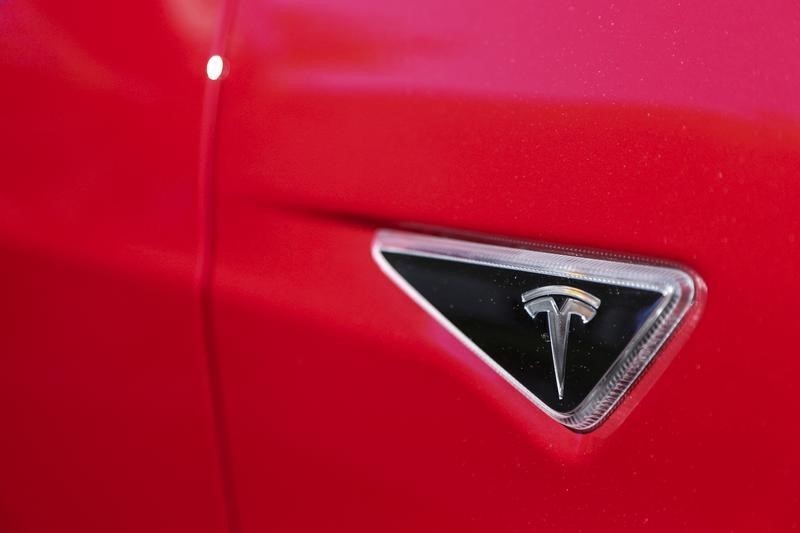This post was originally published on this site
https://i-invdn-com.akamaized.net/news/LYNXMPEB5B115_M.jpg © Reuters.
© Reuters.By Yasin Ebrahim and Kim Khan
Investing.com – Wild market swings came this week as a Black Swan swooped down on 2020 in the form of the coronavirus.
That lent an extra edge of volatility to what was the busiest week of earnings for the season, which also had a Fed decision a Bank of England decision, U.S. GDP and the U.K. officially leaving the EU. It’s not surprising some things may have gone unnoticed.
While stocks were still diving on Friday, investment banks were betting on a white knight to fix the economic ramifications of the coronavirus.
Telsa had another stellar week, but is there one area out its control that could stifle the stock?
And investors shouldn’t ignore the big game this weekend.
Here are three things that flew under the radar this week.
1. In the Fed We Trust
A deadly disease emanating from Wahun, China rocked global markets to the core this week. The turned negative for the month. The , or fear index, spiked to three-month highs. And safe havens like and bonds rode the wave of fear to sharp weekly gains.
In the wake of the rising coronavirus risk, some on Wall Street have warned that a 5% to 10% correction beckons for stock markets. But they appear reluctant to wave the white flag on the decade-long bull run in equities, claiming the Federal Reserve will save the day.
If China’s economy comes under heavy siege from the virus “its 18% weight in the global economy would have an overwhelmingly negative effect on the rest of the global economy,” and likely call the Fed into action, Societe Generale (PA:) said in a note.
Morgan Stanley (NYSE:) agreed, saying the Fed won’t allow an accelerated slump in stocks as “liquidity remains flush.”
But Societe Generale is still not keen to wade into beaten-down stocks.
“In our view, it is too early to call a generalized ‘buy the dips,’ given the newsflow on the virus is currently anything but reassuring,” it said.
J.P. Morgan is a little more daring.
“The latest health scare is likely to worsen before getting better,” but “past outbreaks have tended to drive only limited market falls,” J.P. Morgan said.
These previous health scares did not lead to a prolonged period of selling, and were a “buying opportunity within weeks,” it added.
2. Can Anything Stall Tesla?
It was quite a week for Tesla (NASDAQ:), which seems it can do no wrong at the moment.
It knocked its out of the park, sending the high-flying stock still higher. On Friday, during the massive selloff on coronavirus fears, it ended 1.5% higher, even though its Shanghai factory could be impacted. CEO Elon Musk even dropped an EDM song entitled “Don’t Doubt ur Vibe.”
Is there any fly in Tesla’s ointment? Perhaps one is the attitude of governments towards electric vehicle subsidies.
Around the globe, the message looks mixed.
- In the U.S., Tesla hit the cap of 200,000 vehicles that was set for a $7,500 consumer tax break in 2019 and Congress declined to extend the cap to 600,000 vehicles.
- In China, Beijing plans to end its new energy vehicle (NEV) subsidies after 2020, but said it would not cut subsidies again this summer, which the auto industry saw as a win.
- In Norway, where electric cars make up more than 40% of sales, VAT exemptions have been extended to the end of 2021.
- In Germany, Tesla’s lower-priced Model 3s are subsidized with a grant of 4,000 euros that the government plans to increase by half over the five years from 2020.
- In Canada, the Model 3 can get a rebate of up to C$5,000 under the zeo-emission incentive program.
-
- In the U.K. all Tesla models are eligible for a rebate od up to 3,500 pounds.
3. What’s the Super Bowl to the S&P?
It’s Super Bowl LIV weekend and while U.S. investors may know the connection to equities, the Super Bowl Indicator may have flown under the radar for global traders, especially considering all the other big headlines.
The Super Bowl Indicator says that if a team from the NFC wins the big game there will be bull market that year and if the AFC team wins, there will be a bear market. (It’s quite straightforward if you don’t get too hung up on expansion teams arising after the 1970 NFL/AFL merger and teams switching conferences.)
That means a win by the San Francisco 49ers will be good for stocks and a Kansas City Chiefs win won’t.
Noticed in 1978 by a New York Times sports writer and popularized by market newsletter, this coincidental correlation still gets attention as it’s been mostly right.
Through 53 Super Bowls, in 79% of years when the NFC has won, stocks have ended the year up.
But it’s been wrong the last four games.
For the real gamblers who can’t even wait for the big game, videogame maker Electronic Arts (NASDAQ:) ran its game simulation on “Madden NFL 20,” with the Chiefs taking the Vince Lombardi trophy home, beating the Niners 35-31.
And for those who don’t like sports, there’s the classic January Indicator that says as goes the first month, so goes the year. Friday’s big selloff pushed the just into the red for the month.

